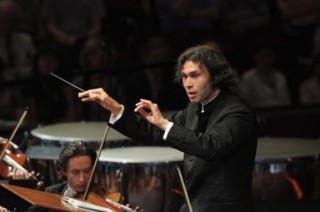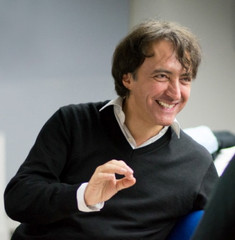|
Back
Paintings by Jurowski New York
Isaac Stern Auditorium, Carnegie Hall
10/16/2014 - & October 13 (San Francisco), 18, 2014 (Chicago)
Magnus Lindberg: Chorale
Sergei Rachmaninoff: Rhapsody on a Theme of Paganini, opus 43
Dmitri Shostakovich: Symphony No. 8 in C Minor, Opus 65
Jean-Efflam Bavouzet (Piano)
London Philharmonic Orchestra, Vladimir Jurowski (Principal Conductor and Musical Advisor)

V. Jurowski (© Chris Christodolou/IMG Artists)
Last night’s Carnegie Hall concert was a tribute, respectively, to composer (Magnus Lindberg), performer (Jean-Efflam Bavouzet) and orchestra (the London Philharmonic). But most of all, the three works were a tribute to their conductor, the young, precise Vladimir Jurowski.
One might expect a conductor of his age to be dazzling, a showman, a man ready to ignore the nuances and prepare the audiences for the huge glowing endings, but he never did that. In all three of these pieces from Russia and Finland, he found a meter which was comfortable, and allowed his ensemble to show just what beautiful lines they could play. With the LPO, that was easy, since everybody from the English horn (in that amazing Shostakovich work) to solo violin and solo clarinet had their times.
Outside of a geographical contiguity, the works had little resemblance. Magnus Linedberg’s work was a study in orchestral seascapes, Rachmaninoff was a treat for the artist, and the Shostakovich Eighth Symphony was a work of such profound inner torment, of such Mahlerian length (over one hour, with the single opening movement taking 30 minutes) that it obviously exercised the conductor.
In fact, the Eighth, as a whole, had an excitement as a whole which exceeded many of its parts. Holding that long opening movement together demands the same concentration that James Levine didn’t quite get in the finale of Mahler’s Ninth this week. Mr. Jurowski came closer, yet even so, this, one of the “war symphonies” perhaps doesn’t quite work outside of its relationship to carnage and horror.
Even in Russia at that time, the Commissar, I read, felt it was “repulsive and ultra individualist… like a piercing dentist’s drill, a musical gas chamber, the sort the Gestapo used.”
But Mr. Jurowski gave it that impetus, and he had the players for the second two scherzos. The trumpets shrieked, the clarinet tootled, and that huge percussion section–especially the kettledrum player–drove the points home.
The last two movements together, were very much like the Mahler, almost self-consciously so. But Jurowski understood, as perhaps only a Russian could, that Shostakovich had his moods of pleasing an audience (his ballets, his film scores) and his moods of saying that this is what had to be said.
In fact, when he ended with that so tranquil oh so poignant C Major in the C Minor symphony, some who hadn’t heard it before, might have felt cheated of their usual bang-bang Shostakovich endings. The simply couldn’t do it. And Jurowski knew this, conducting to the composer’s own inner drummer.
That was by far the longest work for the evening. Magnus Lindberg’s Chorale was the most intriguing. Like a ballplayer sold to a competing team (his tenure as New York Phil composer-in-residence changed to the same position with the LPO), he was represented with a work written a decade ago. Within its six-minute duration, the orchestra–the full massive orchestra with virtually no solos–created a tapestry, disguised, masked, almost an illusion of a Bach chorale, Es is Genug.
This was already used, of course, by Alban Berg, as an austere memorial in the Violin Concerto. But Mr. Lindberg, perhaps eschewing the original words, “It is enough” from the equally profound church cantata, O Ewigkeit, du Donnerwort–”Oh ‘Eternity, thou thunderous word”–was not so much interested in the verbal meaning as the musical implications.
In effect, he started with the notes of the chorale heavily hidden amidst the strings, and then continued–in his words, like the tide moving in and out. And yes, the orchestra, wrestled with the music, allowing us to hear fragments, to listen to a great brass chorale almost of the original, to allow musical tricks, with fingers sliding up and down in violins and violas...
And finishing, like the later Shostakovich Eighth Symphony with a major consonance.
I felt no guilt giving my mind to an image, in this case the massive Mont Saint. Michel, overlooking the sea pulsing away against its battlements/. And when I visited, it was a stormy day, all the more like Mr. Lindberg’s splendid musical seascape.

J.-E. Bavouzet (© Courtesy of the Artist)
In the center of the concert was the always effective, never controversial, Rachmaninoff Paganini Rhapsody. It’s always an audience-pleaser, as it should be. Always showy, glittering, extremely difficult (the composer himself had a hard time playing it!), exceptionally tuneful, a little saccharine... And while a great showpiece for any virtuoso, hardly shows the personality of the artist.
Rachmaninoff was simply too inventive, less morbid than usual (his hallmark Dies irae was just another nice tune), and told the performers’s fingers to do all the work.
Which the young French pianist Jean-Efflam Bavouzet was elated to do. I had never heard him in America (if indeed he has played here before), but he is rightly well known in Europe, with his own piano festival in Norway, and several recordings, ranging from Prokofiev to less well-known composers like Albéric Magnard and Gabriel Pierné.
His Rhapsody performance was befittingly flashy (though never flamboyant) yet most impressive was conductor Jurowski, who never allowed Mr. Bavouzet to simply take over. The conductor was so precise, so careful, that even the most incidental instrumental solos were given their place, neither overwhelming nor sublimating their work, giving a more balanced picture.
Mr. Bazouvet, who seemed ready to give seven or eight encores (all permissible after the genial Rachmaninoff), did only one, Debussy’s Fireworks prelude, which, while technically more than adequate, also had a massive palette, where the “Marseillaise” at the end seemed inevitable.
The pianist is obviously ready to give an interesting solo recital in New York. As for Mr. Jurowski, he is a frequent and always welcome visitor to our shores.
Harry Rolnick
|